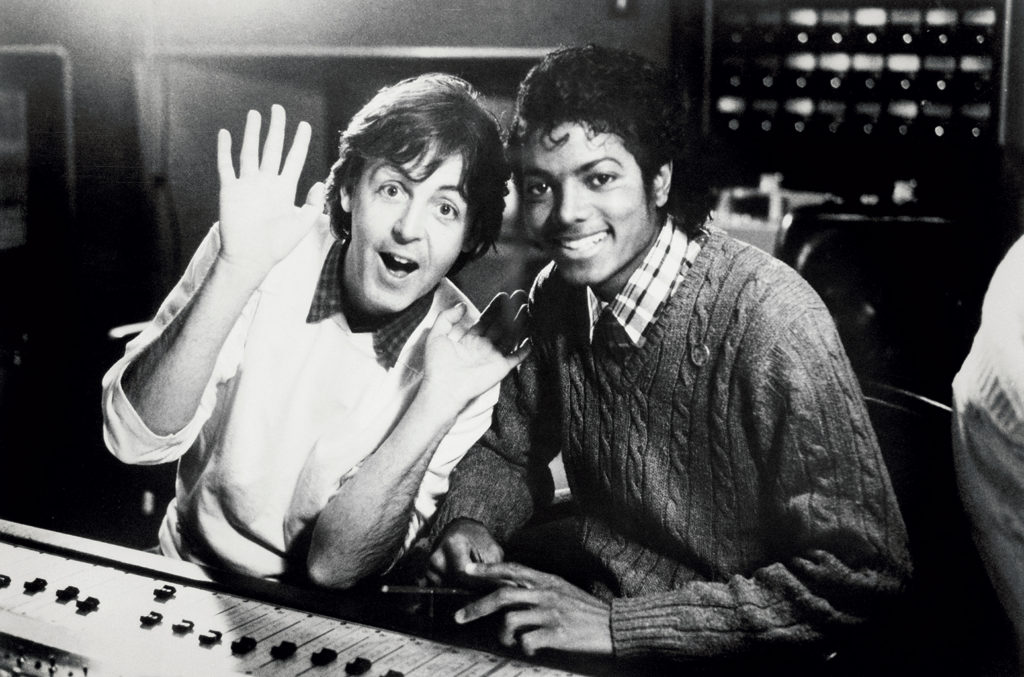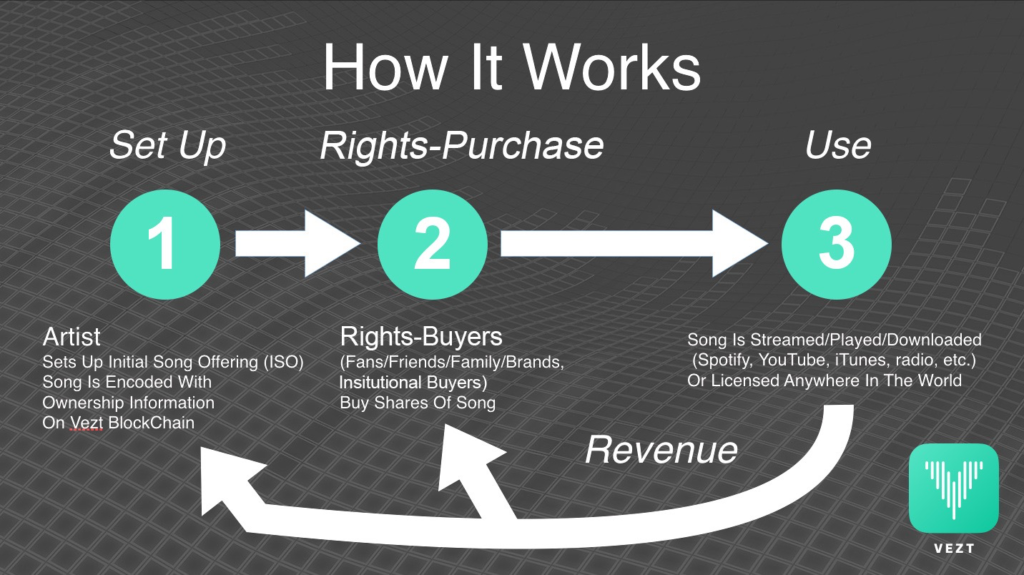It was only a matter of time before cryptocurrency [1] pervaded the music industry. The proliferation and potential applications of blockchain seem to be the perfect fit for the challenges struggling musicians face. While musicians are the creators of their art, it’s the record labels that distribute the music who tend to own the songs. It is for this reason Paul McCartney has now been fighting for 40 years for the rights to The Beatles albums.[3] As technology evolves, some crafty music executives have been devising new ways for musicians to protect and sell their songs.

The Crypto Solution
Hakim Draper, cofounder of Boogie Shack Music Group, has been creating a new means for every artist in the music industry to have their very own digital currency. Boogie Shack has teamed up with Tao Network, a blockchain-based content distribution platform for the music industry, and plans to use XTO tokens (XTO = Tao Network’s abbreviation for it’s cryptocurrency) to create a unique currency for music artists. Each artist will be able to sell rights to their songs in exchange for XTO tokens.[4]

The potential for musician’s intellectual property (IP) to be converted into monetized data will serve as a direct pipeline between artists and their fans. Artists and fans may very well collaborate on songs, merchandising, and tours, meaning the level of fan involvement will directly correlate to an artist’s success. The more artists rely on other funding sources, the more of their rights they are forced to give away. This has the potential to be a great step forward for artists in the music industry assuming that the fans who support these artists using cryptocurrency will have the artist’s best interests in mind. It should also be noted that cryptocurrencies such as XTO—especially in their early phases with limited funding—are controlled by a very small number of people who could potentially thwart/control the artist. It should also be noted—even despite all the traction it has been gaining—cryptocurrency is not regulated by the SEC, so it is new ground that many are skeptical about. There has been no legal entity or other organizational form that governs and protects the ongoing developments and ensures fair decision-making for cryptocurrencies in the United States.[5]
Current Issues in the Music Industry
Most issues stem from the complexities around who “owns” a song. Ownership is critical as it secures the right to royalties for any use of the song for the owners fortunate enough to be royalty holders.[6] As we are in the year 2018, it’s not surprising that streaming has emerged as the most important source of incoming royalties representing 62% of royalty revenue in 2017 (worth about $5 billion). Record companies tend to walk away with the lion’s share of revenue, while only the most popular artists and songwriters gain relatively small sums of money relative to the popularity of their output. To put it in perspective, struggling artists have complained that a million listens on a streaming service are worth about $100 to the writer of the song once the music industry has taken its cut.[8]
Other Music Cryptos are starting to Join the Mix
There are a few blockchain-based solutions that exist for paying musicians via crypto-currency. Bitmark—a crypto startup that uses blockchain technology to enable property rights for digital assets—has partnered with Asia’s largest streaming platform KKBOX to create a mechanism for artists to see instant payments when their songs are streamed on the service.[9]
Another huge startup crypto contender in the blockchain world goes by the name of Vezt. The Los Angeles-based blockchain startup brought in its funds via initial coin offering (ICO) worth $4.7 million, which it’s planning to use to launch its royalties management platform.[10] The team at Vezt has already landed the rights to some 30 songs from music icons: Dr. Dre, Kanye West, Jay-Z, John Legend, and Drake.
The platform allows the rights holder to a song to sell their portion of the rights through an initial song offering (ISO). Artists and rights holders can then choose how much they would like to raise from a fraction of their song, set the reversion term and set a date for the ISO.[11] Rights are purchased with the tokens issued by Vezt. Musicians are paid with the funds from the crypto offering (after Vezt takes its cut), and the digital rights to the song move to the buyer’s Vezt digital wallet. The song rights information is encoded on Vezt’s blockchain, and the startup will distribute purchaser royalties and allow users to store profits on the platform.[12] It should be noted that changing those profits out of Vezt tokens and into fiat currency, or even another form of digital currency, comes with a fee of at least 5%.

Where do Music Cryptos Currently Stand?
Vezt still has a long way to go before it makes a name for itself among the ASCAPS and the BMIs. Drake and J. Cole’s, “Jodeci Freestyle” (strong verse from a younger Cole very Born Sinner) became the first song to ever be featured as an ISO as a Beta test for Vezt last November.[13] However, Drake only offered 10% of the publishing of the song, not the actual master, which means artists are still hesitant to go all in on the platform.[14]
At this stage it is an interesting idea, but one that is not likely to make a lot of money for either artists or investors in the near future until it gains some serious traction. While the current generation of musicians may not become fully acclimated with crypto currency, it is most certainly likely to only gain in popularity among the younger generations. In other words, as musicians from younger generations become pertinent, IP will be more commonly valued as monetized data. Thus, musicians and the music industry alike are looking forward to seeing how monetizing data will impact (and potentially revolutionize) the Intellectual Property industry as a whole.
[1] A digital currency in which encryption techniques are used to regulate the generation of units of currency and verify the transfer of funds, operating independently of a central bank.
[2] A digital ledger in which transactions made in bitcoin or another cryptocurrency are recorded chronologically and publicly.
[3] Jonathan Stempel, Paul McCartney settles with Sony/ATV over Beatles music rights, Reuters Entertainment News (June 30, 2017), https://www.reuters.com/article/us-people-paulmccartney/paul-mccartney-settles-with-sony-atv-over-beatles-music-rights-idUSKBN19L2ET.
[4] Lisa Abeyta, How Cryptocurrency and Blockchain Will Revolutionize the Music Industry, Inc.com (November 17, 2017), https://www.inc.com/lisa-abeyta/how-cryptocurrency-blockchain-will-revolutionize-music-industry.html
[5] Stuermer, M., Abu-Tayeh, G. & Myrach, T. Sustain Sci (2017) 12: 247. https://doi.org/10.1007/s11625-016-0412-2.
[6] Id.
[7] Id.
[8] Id.
[9] Ian Allison, Bitmark partners with Asia’s biggest streaming service KKBOX for music rights and royalties, International Business Times (January 11, 2018), http://www.ibtimes.co.uk/bitmark-partners-asias-biggest-streaming-service-kkbox-music-rights-royalties-1654831.
[10] See https://vezt.co/.
[11] See https://vezt.co/.
[12] Id.
[13] Max Greenwood, Vezt Wants You to Buy Rights to Drake’s Music with Blockchain, Techvibes (November 15, 2017), https://techvibes.com/2017/11/15/vezt-wants-you-to-buy-rights-to-drakes-music-with-blockchain-technology.
[14] Id.

Olisa
Cryptocurrencies are digital or virtual currencies that are encrypted (secured) using cryptography. One of the major differences between crypto-currency (“Crypto”) and the normalized currency is that normalized currency is backed by the government. For example, the Federal Reserve System is the central banking system of the United States created to provide centralized control of the monetary system in order to alleviate financial crises. Crypto, on the other hand, is digital currency that is neither a security (or commodity) regulated by the Securities and Exchange Commission nor FDIC insured. Crypto-currencies like bitcoin (BTC), lite coin (LTE), and Etheruem (ETH) bypass the old banking system, as they are mostly controlled by mathematical algorithms and depend on independent, self-regulating operational systems. Buying and selling are borderless and can be processed by anyone with a computer and internet connection.
The question we now ask ourselves is how is this relatively new form of digital currency going to affect the music industry?
Tokens are the native crypto-assets of block chain applications. Tokens are created and distributed to the public through an Initial Coin Offering (ICO). They are powered by smart contracts (code-based financial agreements) that are programmed into Ethereum or any other Crypto-currency. When an artist monetizes their music, they’re turning their intellectual property (IP) into a financial asset, so an artist’s token value generally reflects the market value of their creative output. Those who buy into an artist’s tokens are buying into owning a share of the artist’s creations and market value. The more people who consume the artist’s creation, the higher the value of the token. This means that artists could create their own tokens, but crypto success will hinge on the both the musical and investment value of an artist.
Tokenization lets artist raise funds upfront without relying on an advance from their record label. This fundraising, in essence, can get rid of the music industry middle-men, like the banks, music-streaming services like Apple music, I-tunes, Spotify, etc., and create a direct link between the musician and the consumer which could have a huge impact on the music industry.
Kristen
Unregulated Market
Cryptocurrencies are considered an unregulated market and are not backed by any bank or financial institution. Due to the lack of regulation cryptocurrency markets are extremely volatile. On a single day, a currency could be trading at $100 dollars per coin and then drastically drop to $5 dollars. The price fluctuation of cryptocurrencies is because the market drives the price of the coin. There is no way to protect one’s financial interest when the market drops drastically in an unregulated market. For the music industry, these tokens could be affected by a plethora of events that are completely unrelated to the music. For example, if Kanye had his own unique token trading on the Tao Network each valued at $500 dollars, but then Kanye decides to post a photo on Instagram that Donald Trump signed his hat that resulted in a large swath of his fans being upset by this post. In turn, these fans outraged by this post decide to sell their tokens to protest Kanye’s actions. The act of a mass sale of tokens by fans causes Kanye’s tokens to now drop to $150 per token in a matter of minutes. Generally-speaking, people are impulsive and highly influenced by other people’s actions, and relying on them for the worth of a token could completely affect how a musician acts socially. Cryptocurrency may give the musician more rights to their intellectual property (IP), but could they be sacrificing their social freedom, artistic creativity, and/or freedom of speech, per se, as a result? If the monetized value of a musician’s work is dependent upon their fans and the public, must they now ensure they do not upset their fans? Now musicians can do what they want and maybe get some hateful mail, comments or tweets. But, what happens when enough fans are upset or a single fan holding enough tokens to affect the worth of a musician’s monetary value does not like their new Instagram post. In such a volatile crypto-market with no financial institution backing, the musicians would run the risk of being at the mercy of their fans to ensure they act in accordance with their fans’ ideals. The question then becomes what is more important: increased IP rights or social freedom?
Cyber Security
Cryptocurrencies are held in virtual wallets and transferred through a variety of exchanges. But, cryptocurrency is not a tangible object one can hold. Therefore, cryptocurrencies sit within cyber space awaiting a potential hack. For example, Coincheck, a Japanese cryptocurrency exchange, lost more than $500 million to online hackers on January 26, 2018. See Evelyn Cheng, JAPANESE CRYPTOCURRENCY EXCHANGE LOSES MORE THAN $500 MILLION TO HACKERS, CNBC, (Jan. 29, 2018) available at https://www.cnbc.com/2018/01/26/japanese-cryptocurrency-exchange-loses-more-than-500-million-to-hackers.html. The hack to the Coincheck exchange was the largest cryptocurrency theft to occur to date. The Coincheck hack is a prime representation that these exchanges are not impenetrable and could cost investors large amounts of money. With no financial institution backing the cryptocurrency, the coins stolen out of your virtual wallet provides you no security to ensure the money you lost. Even attempting to pursue the hacker to return your investment is not easily accomplished. Hackers are notorious for being hard to catch but even more so on cryptocurrency networks because they are designed to be anonymous. Not only are the potential investors putting themselves at risk, but so are the musicians because no virtual wallet, network, or exchange is immune from the potential of a hack. It only takes one good hack to ruin someone.
Potential Regulation
Contrary to what the name may suggest, cryptocurrencies are not actually currency. The Internal revenue Service (IRS), the U.S Commodity Futures Trading Commission (CFTC) and Judge Jack Weinstein from a district court in New York have ruled that virtual currencies can be regulated as a commodity. Judge Weinstein stated “virtual currencies are ‘goods’ exchanged in a market for a uniform quality and value. …They fall well within the common definition of ‘commodity’.” See CFTC v. McDonnell, 287 F.Supp.3d 213, 228 (E.D.N.Y. 2018). Although cryptocurrencies are a commodity and are not currently registered with the Security Exchange Commission (SEC) as a security, that does not mean that they cannot or will not be registered. According to the SEC CEO Jay Clayton, “[b]efore launching a cryptocurrency or a product with its value tied to one or more cryptocurrencies, its prompters must either (1) be able to demonstrate that the currency or product is not a security or (2) comply with applicable registration and other requirements under our securities laws. Additionally, brokers, dealers and other market participants that allow for payments in cryptocurrencies, allow customers to purchase cryptocurrencies on margin, or otherwise use cryptocurrencies to facilitate securities transactions should exercise particular caution, including ensuring that their cryptocurrency activities are not undermining their anti-money laundering and know-your-customer obligations.” See Statement on Cryptocurrencies and Initial Coin Offerings, SEC Chairman Jay Clayton (Dec. 11. 2017), available at https://www.sec.gov/news/public-statement/statement-clayton-2017-12-11#_ftn7. Short of this statement, there has not been any federal regulation on cryptocurrencies. Even the concept of having to register does not regulate the trading of the coins themselves but rather the exchanges. If there is no advance in regulation, the issues of volatility and security may not be solved, unless the exchanges take matters in to their own hands and develop a way to stabilize the market.